
The UN Security Council holds a vote on a Brazilian-drafted resolution that calls for humanitarian pauses in Gaza, at the UN headquarters in New York, U.S., October 18, 2023. /Xinhua
The UN Security Council holds a vote on a Brazilian-drafted resolution that calls for humanitarian pauses in Gaza, at the UN headquarters in New York, U.S., October 18, 2023. /Xinhua
Editor's note: Imran Khalid, a special commentator on current affairs for CGTN, is a freelance columnist on international affairs. The article reflects the author's opinions and not necessarily the views of CGTN.
In the Israeli-Palestinian conundrum, the United States' handling of the situation can only be described as a profound disappointment. The U.S. had the capacity to pursue a more impartial path toward a just resolution to the conflict. However, it chose to align with the increasingly radical Israeli administration, enabling the harsh subjugation of the Palestinian people and inadvertently contributing to the volatile situation that has finally erupted ferociously.
Two recent events have further corroborated the failure of U.S. foreign policy in the Middle East. The first signal of this misstep was the refusal of Arab states to extend a welcoming hand to President Biden following his visit to Israel this week. This diplomatic cold shoulder struck a resounding blow to American clout in the region. The second indication came in the form of the U.S. veto to thwart a resolution calling for a ceasefire in the Gaza Strip. These two events have spotlighted the lamentable state of affairs in which U.S. diplomacy finds itself in the midst of this conflict.
The United Nations Security Council (UNSC) has always been a platform for diplomacy, where countries are expected to set aside their differences and work together for peace and stability. However, the recent opposition vote by Washington has raised serious concerns about its dedication to these principles. The international community has expressed its disappointment and surprise at the U.S.'s decision, stressing the need for a fair and immediate ceasefire. The resolution, presented by Brazil, was aimed at prioritizing a ceasefire, reflecting the broadest consensus within the international community. Its purpose was to put an end to the escalating situation in Gaza, where innocent civilians continue to lose their lives and suffer every minute.
The reasons provided by the U.S. for its veto appear implausible. The assertion that the resolution did not acknowledge Israel's right to self-defense holds no basis. Factually speaking, there was no conflict between the resolution and Israel's self-defense. Concerns about the intentions of the United States were further reinforced during U.S. President Joe Biden's visit to Israel, where he appeared inclined to align with Israel in its military action against Hamas rather than actively pursuing a peaceful solution to the ongoing bloody conflict.

U.S. President Joe Biden addresses the nation on the Israeli-Palestinian conflict and the Russia-Ukraine conflict from the Oval Office of the White House in Washington, D.C., U.S. October 19, 2023. /CFP
U.S. President Joe Biden addresses the nation on the Israeli-Palestinian conflict and the Russia-Ukraine conflict from the Oval Office of the White House in Washington, D.C., U.S. October 19, 2023. /CFP
The objective of the resolution was to condemn violence against civilians, acts of terrorism, encourage adherence to law and to ensure unimpeded access to essential goods and services for civilians. By vetoing this resolution, the United States has shown disregard for the crisis in Gaza. It has highlighted its double standards on human rights issues. The biased approach of the United States towards the conflict has only contributed to further escalation.
The UNSC and the global community cannot afford to remain idle in the face of such behavior. It is crucial for them to apply pressure and strongly denounce the actions of the United States. For obvious reasons, the rejection of the resolution has sparked global criticism. China has expressed serious disappointment, specifically emphasizing the importance of objectivity, impartiality and adherence to international law when dealing with conflicts at an international level. China along with others has been urging the United States to take on a role in resolving this crisis.
This is not the first time that the United States has used its veto power to block resolutions addressing the Palestinian conflict. The American veto has left the international community feeling frustrated and raising doubts about Washington's sincerity towards efforts for a lasting peace in the Middle East.
The situation in Gaza is dire; both sides of this conflict have suffered thousands of casualties. The recent explosion at a Gaza hospital shocked people globally, which also triggered this UN Security Council vote. The aim of the UNSC resolution was to establish a much-needed pause, for diplomatic negotiations and providing essential aid. Sadly though, this opportunity was wasted by the United States decision.
The longstanding alliance between the United States and Israel, often seen as unbreakable, has influenced the way the Palestinian conflict is approached. At the same time, the domestic political considerations within the U.S. have also added complexity to its role in this conflict. The U.S. government has made the conscious choice to unwaveringly support Israel, a decision that not only hampers its ability to play a mediating role, but exacerbates the ongoing crisis.
The ramifications of America's steadfast endorsement of Israel extend far beyond this specific conflict, as they fundamentally undermine the credibility and effectiveness of international institutions like the United Nations, which are vital for upholding global peace and security. It is abundantly clear that the American involvement in this ongoing Palestinian-Israeli conflict has done little more than sow chaos and exacerbate instability.
The global community's resounding plea for a ceasefire and humanitarian assistance must not be dismissed, serving as a compelling call for America to reconsider its stance and pursue a path that prioritizes peace and the respect for the rights of all involved parties.
(If you want to contribute and have specific expertise, please contact us at opinions@cgtn.com. Follow @thouse_opinions on Twitter to discover the latest commentaries in the CGTN Opinion Section.)